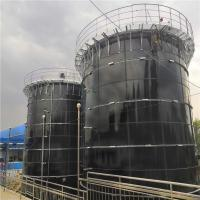What are the Benefits and Limitations of GFS Tanks?
GFS tanks, also known as Glass-Fused-to-Steel tanks, are widely used in many industries for their durability, flexibility, and ease of installation. In this article, we will discuss the benefits and limitations of GFS tanks.
Benefits:
Corrosion resistance: GFS tanks are highly resistant to corrosion, thanks to their glass coating. The coating acts as a barrier between the tank and the environment, protecting it from rust and other forms of corrosion.
Durability: GFS tanks are incredibly durable and can last for several decades. The glass coating is fused to the steel at high temperatures, creating a bond that is stronger than the original steel. This makes GFS tanks an ideal solution for storing water, chemicals, and other liquids that can cause corrosion and deterioration.
Flexibility: GFS tanks are available in various sizes, shapes, and configurations, making them ideal for a wide range of applications. They can be customized to fit specific needs, and their modular design allows for easy expansion and relocation.
Easy to install: GFS tanks can be assembled quickly and easily using standard tools. The modular design and lightweight components make installation fast and straightforward, reducing labor costs and downtime.
Low maintenance: GFS tanks require minimal maintenance, thanks to their durable glass coating. They do not require repainting or recoating, and the smooth surface of the glass prevents the buildup of dirt and debris.
Limitations:
Initial cost: The initial cost of GFS tanks can be higher than other types of tanks, such as concrete or steel. However, this cost is offset by their long-term durability and low maintenance requirements.
Temperature limitations: GFS tanks are not suitable for storing liquids at extreme temperatures, such as boiling water or liquid nitrogen. The glass coating can crack or shatter under extreme temperature changes.
Limited resistance to physical impact: While GFS tanks are highly resistant to corrosion, they may be susceptible to damage from physical impact. The glass coating can chip or crack if the tank is struck by heavy objects, such as falling debris.
Installation limitations: GFS tanks require a stable foundation and proper installation to ensure their long-term durability. Improper installation can result in leaks or other problems that can compromise the tank's integrity.
Chemical compatibility: While GFS tanks are compatible with most chemicals, there are some exceptions. Certain chemicals may react with the glass coating and cause damage to the tank. It is essential to ensure that the tank's glass coating is compatible with the liquids being stored.
In conclusion, GFS tanks offer many benefits, such as corrosion resistance, durability, flexibility, ease of installation, and low maintenance requirements. However, they also have some limitations, such as initial cost, temperature limitations, limited resistance to physical impact, installation limitations, and chemical compatibility. When choosing a tank for your specific needs, it is essential to consider both the benefits and limitations of GFS tanks to make an informed decision.

评论
发表评论